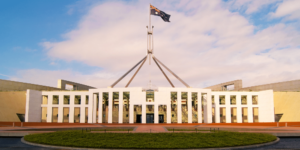Forming a government sounds simple: win a majority of the 151 seats in the House of Representatives and you’re there.
However, what if nobody gets to 76? It’s happened before, most recently in 2010, and it could happen again in the upcoming Federal Election.
It’s called a hung parliament, and it means the major parties need to team up with minor parties or independents to form a minority government.
Let’s explain.
First, how does a hung parliament happen?
Right now, the Coalition has 76 seats, Labor has 68, and the remaining seven are independents. This means the Coalition has enough seats to form a majority government on its own.
But in some cases no party will have enough seats to form government on its own.
Then what?
The major parties then have to negotiate with the independents and minor parties. They’re called the ‘crossbench‘ because they sit in the middle of the House of Reps.

One of the major parties must get enough crossbenchers to commit to ‘guarantee supply’, a technical term which basically means they agree to support them to become the government by promising to vote with them on basic government business. If a major party can make it to 76 this way, they form a minority government.
This doesn’t mean the crossbenchers form a binding alliance with the major party they support, or that they vote with them on every issue. The crossbenchers vote how they want on any issue, and they can change their minds at any time – essentially giving them the power to change who is in government.
That gives crossbenchers a lot of power in a hung parliament. They can use that power to win concessions from the major parties on policies that are important to them.
Has a hung parliament happened before?
Yes, most recently in 2010. The Gillard Labor Government formed a minority government with the support of the Greens and three independents. Labor made it through an entire term without losing the support of the crossbench, but was forced to negotiate on a range of contentious issues.
Could a hung parliament happen this election?
It’s definitely possible. There were seven crossbenchers in the current Parliament and there is a chance there will be even more this time. There are several high-profile campaigns from independent candidates this time, especially in affluent seats traditionally held by the Liberal Party. If some of these independents are successful and the crossbench becomes even larger, it’s even less likely that either major party will reach 76 seats.

Who is likely to win Government if it is a hung parliament?
Nobody knows. Most independents have not given a clear indication of which major party they would support in the event of a hung parliament. Many of the high-profile independents are running in traditionally Liberal-supporting areas, so may be expected to support a Coalition Government, but many are also campaigning for stronger action on climate change and a national integrity commission – so may consider their policies to be more aligned with a Labor Government. We’ll have to cross that bridge when we come to it!



